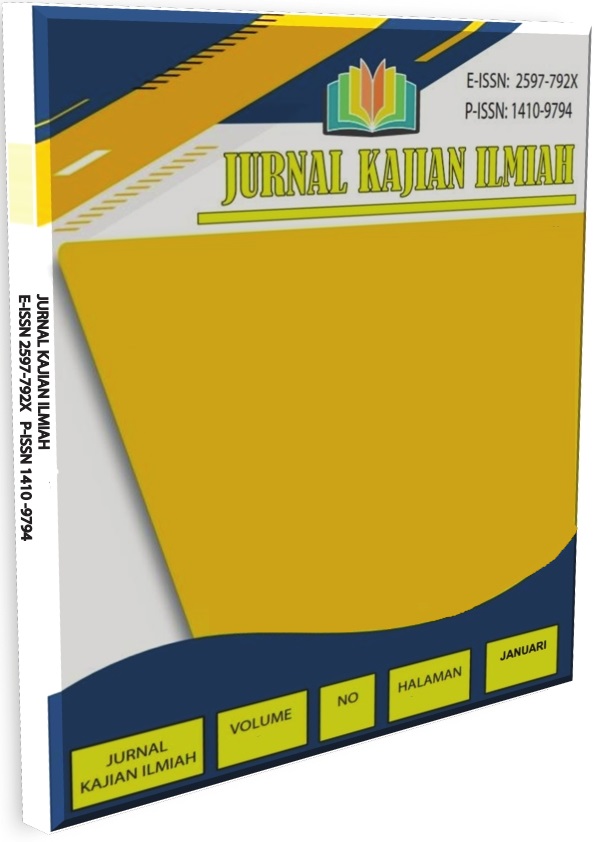Prinsip Perkawinan Islam Ditinjau Dari Perspektif Psikologi
DOI:
https://doi.org/10.31599/pn48wf16Keywords:
Islam, Marriage, PsychologyAbstract
The commands and prohibitions in the Islamic principles in marriage that are applied to humans are created upon human characteristics and nature. Every individual has psychological uniqueness, so in order to understand family life, it is required to take a psychological approach. To improve the quality of marriage, it is necessary to conduct a study about the Islamic principles on marriage and the views from psychological perspective in its implementations. This study aims to explain the principles of marriage in Islam and the psychological symptoms that come along with them. The study method is literature study with descriptive analysis technique. The Islamic principles on marriage that are discussed in this article are divided into principles in premarital life, married life, and divorce. Psychological symptoms that arise in the implementation of the Islamic principles in marriage proved that the instructions regarding marriage life in the Alquran and hadith have a good impact on one’s mental condition, and prohibitions exist to help avoid any mental discomforts.
Downloads
References
DeGenova. (2008). Intimate Relationshops, Marriages & Families. Mc Graw-Hill.
Duvall, E. M., & Miller, B. C. (1985). Marriage and Family Development. Harper & Row.
Fieder, M., & Huber, S. (2016). The association between religious homogamy and reproduction. Proceedings of the Royal Society B: Biological Sciences. https://doi.org/https://doi.org/10.1098/rspb.2016.0294
Fitriana, H., & Suhastini, N. (2021). Dinamika psikologis istri pertama yang dipoligami (studi kasus pada suku sasak nusa tenggara barat). Qawwam: Journal for Gender Mainstreaming, 15(2). https://doi.org/https://doi.org/10.20414/qawwam.v15i2.4153
Hawari, D. (2006). Marriage Counseling (Konsultasi Perkawinan). Balai Penerbit Fakultas Kedokteran Universitas Indonesia.
Hawari, D. (2010). Tanya Jawab Seputar Perkawinan Ditinjau dari Kesehatan Jiwa dan Agama (Islam). Balai Penerbit Fakultas Kedokteran Universitas Indonesia.
Lamanna, M. A., Riedman, A., & Stewart, S. D. (2018). Marriages, Families, and Relationships: Making Choices in a Diverse Society (13th ed.). Cengage Learning.
Lauer, R., & Lauer, J. (2012). Marriage and Family: The Quest for Intimacy. Mcgraw hill.
Leeker, O., & Carlozzi, A. (2014). Effects of sex, sexual orientation, infidelity expectations, and love on distress related to emotional and sexual infidelity. Journal of Marital and Family Therapy, 40(1), 68–91. https://doi.org/https://doi.org/https://doi.org/10.1111/j.1752-0606.2012.00331.x
Mubarok, A. (2009). Psikologi Islam: Kearifan dan Kecerdasan Hidup. Wahana Aksara Prima.
Najati, M. U. (2004). Al-Quran dan Ilmu Jiwa. Pustaka.
Rahman. (1992). Perkawinan dalam Syariat Islam. Rineka Cipta.
Riami. (2020). Perceraian Menurut Persepsi Psikologi dan Hukum Islam. Imtiyas: Jurnal Ilmu Keislaman, 4(2). https://jurnal.staim-probolinggo.ac.id/index.php/Imtiyaz/article/view/94
Sari, D. P. (2021). Telaah kritis marital satisfaction dalam perspektif al Quran dan psikologi positif. Al Quds: Jurnal Studi Alquran Dan Hadis, 5(2), 693–716. https://doi.org/https://doi.org/10.29240/alquds.v5i2.2703
Siddik, H. A. (1983). Hukum Perkawinan Islam. Tintamas.
Suraiya, R., & Jauhari, N. (2019). Memilih calon pasangan suami-istri dalam perkawinan islam (tinjauan psikologi keluarga islam). Al-‘Adalah: Jurnal Syariah Dan Hukum Islam, 4(2), 105–120. https://doi.org/https://doi.org/https://doi.org/10.31538/adlh.v4i2.493
Williams, B. K., Sawyer, S. C., & Wahlstrom, C. M. (2006). Marriages, Families, and Intimate Relationships: A Practical Introduction. Pearson Education.
Zahara, R., & Makhfud. (2022). Problematika pernikahan beda agama: antara konsep dan praktek di masyarakat. Indonesian Journal of Humanities and Social Sciences, 3(59–72).
Zed, M. (2008). Metode Penelitian Kepustakaan. Yayasan Obor Indonesia.
Ziaee, T., Jannati, Y., Mobasheri, E., Taghavi, T., Abdollahi, H., Modanloo, M., & Behnampour. (2014). The Relationship Between Marital and Sexual Satisfaction Among Married Women Employees at Golesten University of Medical Sciences, Iran. Iranian Journal of Psychiatry and Behavioran Sciences, 8(2).












_-_Copy1.jpg)




